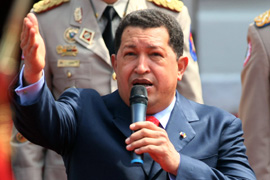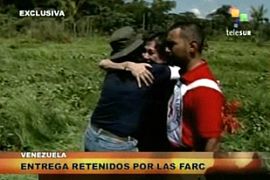Television pictures from the Caracas-based Telesur channel showed both women smiling and looking well as they were released by rebels.
The two were met by members of the International Committee of the Red Cross under whose auspices the operation was undertaken by the Colombian and Venezuelan governments.
It is the first time Farc, Latin America’s oldest rebel group, has released any of its high-profile hostages.
‘Being reborn’
Hugo Chavez, the Venezuelan president, earlier announced that the helicopters he sent into Colombia had picked up the two former politicians and he had spoken to them by telephone.
“They are free. I told them both, ‘Welcome to life’,” he told reporters.
Chavez later met Rojas and Gonzalez before bringing them to the presidential palace in Caracas where he was photographed with them and their family members.
“It still seems like I’m kind of dreaming,” Rojas’ mother Clara de Rojas, said in Caracas, her voice choked with tears.
“President [Chavez], a thousand thanks for your humanitarian gesture,” Gonzalez, a former congresswoman was shown telling Chavez on a satellite phone before he met them.
“We are being reborn,” Rojas said.
Chavez said he hoped the mission would open the way for the release of more hostages.
Mariana Sanchez, Al Jazeera’s correspondent in Caracas, said the two women appeared far healthier than anyone could have expected given previous images of the former Colombian presidential candidate Ingrid Betancourt, looking gaunt.
Betancourt’s family welcomed the release of Rojas, a former aide to the French-Colombian politician who remains in captivity.
Proof of life
Earlier, Farc rebels delivered “proof of life” to Ramon Rodriguez Chacin, the Venezuelan interior minister who was on board one of the Venezuelan helicopters in the mission.
 |
Chavez says more hostages could
now be released [AFP] |
Speaking to Colombia’s radio Caracol after her release, Rojas said Chavez would receive the evidence before passing it on to their families.
“We were a group of 10 people. They were authorised to give proof that they were alive and the guerrilla commanders delivered it this morning” to the Venezuelan representative, Rojas said.
Monica Villamizar, Al Jazeera’s correspondent in Bogota, said relatives of the other hostages were waiting anxiously for news and there were unconfirmed rumours that more captives could be handed over.
The remaining eight hostages in the group of 10 are Luis Eduardo Gechem, Gloria Polanco and Orlando Beltran, all former members of congress, Alan Jara, the former governor of Meta department, as well as four army and police officers.
Farc is holding about 46 high-profile hostages hoping to exchange them for hundreds of its jailed fighters.
Melanie Delloye, Betancourt’s daughter said the release was “a wonderful step towards bringing home all the other hostages, including my mother”.
“It shows that when there is a will, progress is possible.”
The release of Rojas, who was abducted in 2001, and Gonzalez, who was taken in 2002, is a boost for Chavez who had seen his relations sour with Alvaro Uribe, his Colombian counterpart, after a similar rescue deal collapsed last month.
On Thursday, a laboratory in Spain confirmed DNA results showing that a three-year-old boy at a Bogota orphanage is the son of Rojas, born in captivity.
In a brief interview with Caracol Radio after her release, Rojas told how she gave birth to the boy on April 16, 2004, by Caesarean section under primitive conditions.
“I gave him the name Emmanuel because he was a gift from God,” said Rojas, “He was so small and so cute. What most amazed me most was his smile.”
She added she had no information about the father’s whereabouts.
Following the risky delivery in the jungle, Rojas said she spent 40 days in bed under a female Farc fighter’s care, but was then returned to the other hostages where she was allowed to see her baby for only a few hours each day.
“It was difficult [raising the child] because there were military issues – the helicopters overhead and the fact we were isolated and unable to leave,” she said.
After eight months, the baby, suffering from jungle-born maladies and a broken left arm, was separated from Rojas for good.
Chavez promised last year he would secure the release of the two women and the boy, Emmanuel, but the deal collapsed as it emerged the boy had already been in Bogota in the care of a foster family, for more than two years.
Al Jazeera’s Villamizar said the whole of Colombia was tuned in to the story and that there would now be hopes of more hostage releases.


